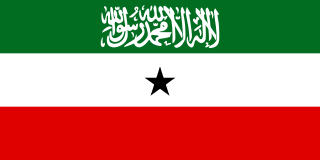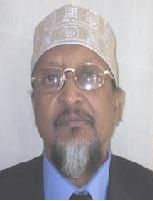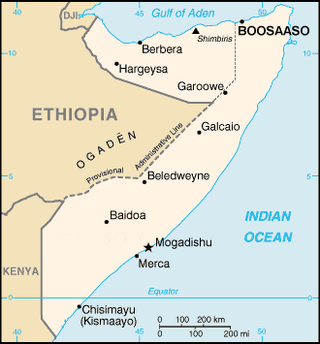Related Research Articles

Somalia, officially the Federal Republic of Somalia, is a country in the Horn of Africa. The country is bordered by Ethiopia to the west, Djibouti to the northwest, the Gulf of Aden to the north, the Indian Ocean to the east, and Kenya to the southwest. Somalia has the longest coastline on Africa's mainland. Its terrain consists mainly of plateaus, plains, and highlands. Hot conditions prevail year-round, with periodic monsoon winds and irregular rainfall. Somalia has an estimated population of around 17.1 million, of which over 2 million live in the capital and largest city Mogadishu, and has been described as Africa's most culturally homogeneous country. Around 85% of its residents are ethnic Somalis, who have historically inhabited the country's north. Ethnic minorities are largely concentrated in the south. The official languages of Somalia are Somali and Arabic. Most people in the country are Muslims, the majority of them Sunni.

Somaliland, officially the Republic of Somaliland, is an unrecognised sovereign state in the Horn of Africa, recognised internationally as de jure part of Somalia. It is located in the southern coast of the Gulf of Aden and bordered by Djibouti to the northwest, Ethiopia to the south and west, and Somalia to the east. Its claimed territory has an area of 176,120 square kilometres (68,000 sq mi), with approximately 5.7 million residents as of 2021. The capital and largest city is Hargeisa. The government of Somaliland regards itself as the successor state to British Somaliland, which, as the briefly independent State of Somaliland, united from 1960 to 1991 with the Trust Territory of Somaliland to form the Somali Republic.

Puntland, officially the Puntland State of Somalia, is a Federal Member State in northeastern Somalia. The capital city is the city of Garoowe in the Nugal region, and its leaders declared the territory an autonomous state in 1998. Geographically to the west, Puntland lays claim to the intra-46th meridian territories that were outside European colonial rule during parts of the Scramble for Africa period.

Hassan Abshir Farah was a Somali politician. He previously served as mayor of Mogadishu and interior minister of Puntland. From November 12, 2001 to November 8, 2003, he was also prime minister of Somalia. Farah was an MP in the Federal Parliament of Somalia.

Burao, also spelt Bur'o or Bur'ao, is the capital of the Togdheer region and the second largest city in Somaliland. Burao was also the third largest city of Somalia and the site of the declaration of an independent Somaliland on 18 May 1991.

The Isaaq (Somali: Reer Sheekh Isxaaq, is a major clan in Somaliland. It is one of the major clans belonging to the Dir clan in the Horn of Africa, with large and densely populated traditional territories.

The politics of Somaliland take place within a hybrid system of governance, which, under the Somaliland constitution, combines traditional and western institutions. The constitution separates government into an executive branch, a legislative branch, and a judicial branch, each of which functions independently from the others.

Foreign relations of the Republic of Somaliland are the responsibility of the Ministry of Foreign Affairs of the Republic of Somaliland. The region's self-declaration of independence remains unrecognised by the international community.

The Somaliland National Armed Forces are the military services of the Republic of Somaliland. The Somaliland National Armed Forces consist of the Somaliland National Army, the Somaliland Coast Guard, the Somaliland Police Force, the Somaliland Custodial Corps, the Somaliland Immigration and Border Control and the Somaliland Fire Brigade. There is no air force. The Armed Forces is under the command of President Muse Bihi Abdi, who is the Commander-in-chief. Minister of Defence Abdiqani Mohamoud Aateye is the designated minister that oversees the armed forces.

The Hargeisa–Bosaso bombings occurred on October 29, 2008, when six suicide bombers attacked in coordinated car bombings targets in Hargeisa, the capital of Somaliland, and the Puntland port of Bosaso in northeastern Somalia. The bombings killed at least 30 people.

Oodweyne is a district in the central Togdheer region of Somaliland. The plains of this land-mass was historically referred to as Garoodi.

Gabiley District is a district in the Maroodi Jeex province of Somaliland, with its capital in Gabiley.

Denmark–Somalia relations are bilateral relations between Denmark and Somalia.

Healthcare in Somalia is largely in the private sector. It is regulated by the Ministry of Health of the Federal Government of Somalia. In March 2013, the central authorities launched the Health Sector Strategic Plans (HSSPs), a new national health system that aims to provide universal basic healthcare to all citizens by 2016. Somalia has the highest prevalence of mental illness in the world, according to the World Health organization. Some polls have ranked Somalis as the happiest people in Sub-Saharan Africa.

The International Development Law Organization (IDLO) is an intergovernmental organization dedicated to the promotion of the rule of law.
Khadra Hussein Mohammad is a Somali lawyer, who became the first National Deputy Prosecutor in Somaliland in 2010. She was supported in her training by the United Nations Development Programme. Mohammad is also the first female judge in Somalia.

Parliamentary elections were held in Somaliland on 31 May 2021, alongside local district elections. The election was Somaliland's first parliamentary election since 2005, and politicians pointed to the election as evidence of its political stability. Three parties – the populist Somaliland National Party (Waddani), the centre-left Justice and Welfare Party (UCID), and the ruling party, the liberal Kulmiye Peace, Unity, and Development Party – put forward 246 candidates who competed for 82 seats in the House of Representatives. More than one million people, out of about four million residents total, registered to vote. On 6 June, the National Electoral Commission (NEC) announced that Waddani had received a plurality of seats with 31; Kulmiye received 30, and UCID received 21. As no party had received an outright majority, Waddani and UCID announced they would form a political alliance.

The Ministry of Justice of the Republic Somaliland administers the court system and has the authority to hire court personnel, allocate funds, and train, discipline or dismiss judicial officers. According to Articles 7 and 38 of the Organisation of the Judiciary Law, the ministry even compiles a panel of assessors on an annual basis for the regional courts. Additionally, the ministry is a member of the Judicial Commission. The current minister is Mustafe Mohamoud Ali
Events in the year 2022 in Somaliland.
References
- 1 2 3 4 Somalia, UNDP (9 September 2015). "Aswan Harmud, first female Prosecutor of Somaliland — Hargeisa". medium.com. Retrieved 4 November 2017.
- ↑ "Somaliland: Meet the Country's First Female Prosecutor - Somali News Network - Magaalo.com". magaalo.com. Archived from the original on 7 November 2017. Retrieved 4 November 2017.
- ↑ "Somaliland: Meet the Country's First Female Prosecutor". www.somalilandinformer.com. Archived from the original on 7 November 2017. Retrieved 4 November 2017.
- 1 2 3 4 "A new generation of rule of law profesionals[sic] in Somaliland". UNDP Representation Office in Brussels. Archived from the original on 16 July 2019. Retrieved 4 November 2017.
- 1 2 "Somali voices". so.one.un.org. Archived from the original on 7 November 2017. Retrieved 4 November 2017.